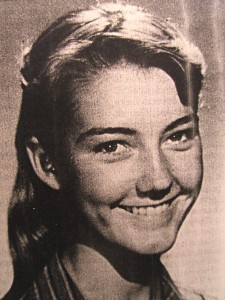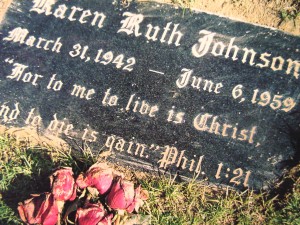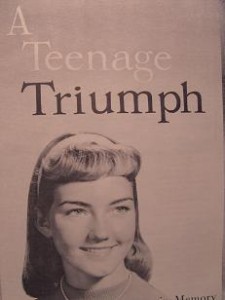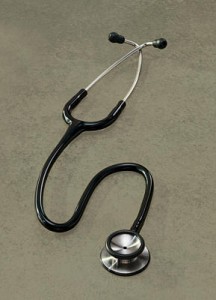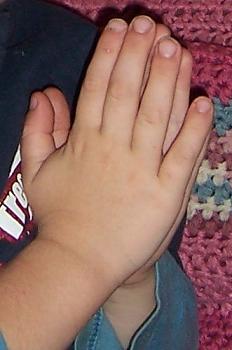[ Two days ago I promised to blog about the cousin who was killed in a car crash, the second childhood incident that taught me about prayer’s importance. One day late, here it is. ]
Growing up, we had five cousins living in distant California. The oldest, Karen, was a bit older than the rest of us, and we all looked up to her. She was full of personality with many friends, and when she was 17, one of them invited her to be a bridesmaid in her wedding.
That weekend Karen happily climbed into the groomsman’s blue Corvette, and with the top down, they began their two hour drive to the rehearsal. The bride and groom followed in their own sports car. While rounding a curve, a car driven by a drunk driver on a spree with three buddies crossed the centerline and slammed head-on into the Corvette.
Karen and her driver were both killed, the bride and groom critically injured. The drunk driver and two of his passengers died, too, and the wedding never took place.
The night our family got the phone call with this shocking news, I watched my parents, in the midst of their confusion and sorrow, turn to God in prayer. After flying to California the next day, I observed one scene after another that didn’t line up with my 12 year old world view. Watching my mom and aunt weep freely was bad enough, but I’d never seen a man cry. The low point came during the funeral when I looked down the church pew and saw my dad’s profile. Although he was facing forward not making a sound, tears were running down his face, and life seemed to fall apart.
Karen’s parents prayed countless prayers during those difficult days as they asked God to use her life and also her death for his purposes. I noticed that communication with God seemed to anchor unsteady adults.
When Karen’s senior English teacher gave her parents the last school assignment she’d turned in, my aunt and uncle were able to read her candid “Philosophy of Life.” In no-nonsense words, she detailed her love for Christ, quoting Philippians 1:21: “For to me, to live is Christ, to die is gain.” They were comforted to see, in her handwriting, these words: “I know that after death I will go to be with Him forever.”
That school assignment eventually became the centerpiece of a pamphlet entitled “Teenage Triumph” and was printed in 14 languages, distributed on every continent. Countless young people have come to Christ because of her testimony during the 51 years since her death. Eventually her story was included in a book entitled MORE THAN CONQUERORS along with celebrities like Chuck Colson, Corrie Ten Boom, C. S. Lewis and Billy Graham.
When Karen’s parents were in their eighties, a film company making a video about answered prayer asked if they’d be willing to share their daughter’s story again, as one of five examples on the hour-long documentary. Although the interview brought back some of their pain, joy over the wide-ranging impact of Karen’s life led them to say yes.
My uncle reiterated on tape how they’d dedicated Karen to the Lord when she was born, and so she’d really belonged to him all along. He said, “Her life has counted. Her death has counted. And her influence was greater after she died than before.”
I began to see that God hadn’t “killed Karen” in a random act of cruelty but had let it happen for specific, eternal purposes. And remembering that her parents had prayed for her life to be used by him, I began to glimpse the vast scope of prayer.
God takes us at our word. He hears every utterance and has the power to affect dramatic change. I’ve found that watching him work is one of life’s peak thrills. To me, forfeiting a chance to pray about something is to throw away an opportunity unequaled by any other.
“I am praying to you because I know you will answer, O God. Bend down and listen as I pray. Show me your unfailing love in wonderful ways. Satisfy the hunger of your treasured ones.” (Palm 17:6,7,14b)

